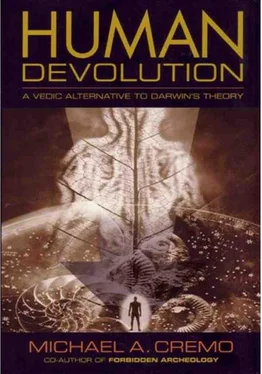Michael Cremo - Human Devolution - A Vedic Alternative To Darwin's Theory
Здесь есть возможность читать онлайн «Michael Cremo - Human Devolution - A Vedic Alternative To Darwin's Theory» весь текст электронной книги совершенно бесплатно (целиком полную версию без сокращений). В некоторых случаях можно слушать аудио, скачать через торрент в формате fb2 и присутствует краткое содержание. Год выпуска: 2003, ISBN: 2003, Издательство: Torchlight Publishing, Жанр: Старинная литература, на английском языке. Описание произведения, (предисловие) а так же отзывы посетителей доступны на портале библиотеки ЛибКат.
- Название:Human Devolution: A Vedic Alternative To Darwin's Theory
- Автор:
- Издательство:Torchlight Publishing
- Жанр:
- Год:2003
- ISBN:9780892133345
- Рейтинг книги:4 / 5. Голосов: 1
-
Избранное:Добавить в избранное
- Отзывы:
-
Ваша оценка:
- 80
- 1
- 2
- 3
- 4
- 5
Human Devolution: A Vedic Alternative To Darwin's Theory: краткое содержание, описание и аннотация
Предлагаем к чтению аннотацию, описание, краткое содержание или предисловие (зависит от того, что написал сам автор книги «Human Devolution: A Vedic Alternative To Darwin's Theory»). Если вы не нашли необходимую информацию о книге — напишите в комментариях, мы постараемся отыскать её.
Human Devolution: A Vedic Alternative To Darwin's Theory — читать онлайн бесплатно полную книгу (весь текст) целиком
Ниже представлен текст книги, разбитый по страницам. Система сохранения места последней прочитанной страницы, позволяет с удобством читать онлайн бесплатно книгу «Human Devolution: A Vedic Alternative To Darwin's Theory», без необходимости каждый раз заново искать на чём Вы остановились. Поставьте закладку, и сможете в любой момент перейти на страницу, на которой закончили чтение.
Интервал:
Закладка:
The process by which conscious selves descend to the realm of the material energy, and are placed in material bodily vehicles, is the primary meaning of devolution, as I have defined it. But there is another sense in which conscious selves devolve. According to its quality of consciousness, a conscious self can receive any kind of body. The human body is especially valuable, because in the human form the conscious self can understand the difference between spirit and matter, and make progress on the way back to its original spiritual home. However, if a conscious self misuses the human form, it will after death take birth in a body not as well equipped for self realization. The conscious self can descend into the animal and plant species. If this happens, the conscious self must then usually pass through births in several species before again attaining the human form. This process may be characterized as a kind of spiritual evolution.
There is yet another sense of devolution. That is the decline of human qualities and characteristics in the course of yuga cycles. Each day of Brahma is made up of one thousand yuga cycles. Each cycle lasts 4,320,000 years and consists of four yugas, or ages: a Satya Yuga, a Dvapara Yuga, a Treta Yuga, and a Kali Yuga. With the passing of each yuga in the cycle, humans decrease in their physical, mental, and spiritual qualities. We are now in the Kali Yuga of one of the yuga cycles. This Kali Yuga began about five thousand years ago. The Shrimad Bhagavatam, which according to the text itself was compiled at just about that time, contains predictions for the Kali Yuga. For example, the Shrimad Bhagavatam (1.1.10) says, “O learned one, in this iron age of Kali men have but short lives. They are quarrelsome, lazy, misguided, unlucky and, above all, always disturbed.” More details can be found in the twelfth canto of Shrimad Bhagavatam (12.2.1–22): “Sukadeva Gosvami said: Then, O King, religion, truthfulness, cleanliness, tolerance, mercy, duration of life, physical strength and memory will all diminish day by day because of the powerful influence of the age of Kali. In Kali-yuga, wealth alone will be considered the sign of a man’s good birth, proper behavior and fine qualities. And law and justice will be applied only on the basis of one’s power. Men and women will live together merely because of superficial attraction, and success in business will depend on deceit. Womanliness and manliness will be judged according to one’s expertise in sex. . . . A person’s spiritual position will be ascertained merely according to external symbols. . . . A person’s propriety will be seriously questioned if he does not earn a good living. And one who is very clever at juggling words will be considered a learned scholar. A person will be judged unholy if he does not have money, and hypocrisy will be accepted as virtue. . . . and beauty will be thought to depend on one’s hairstyle. Filling the belly will become the goal of life, and one who is audacious will be accepted as truthful. . . . As the earth thus becomes crowded with a corrupt population, whoever among any of the social classes shows himself to be the strongest will gain political power
. . . Harassed by famine and excessive taxes, people will resort to eating leaves, roots, flesh, wild honey, fruits, flowers and seeds. Struck by drought, they will become completely ruined. The citizens will suffer greatly from cold, wind, heat, rain and snow. They will be further tormented by quarrels, hunger, thirst, disease and severe anxiety. The maximum duration of life for human beings in Kali-yuga will become fifty years. . . . The path of the Vedas will be completely forgotten in human society, and so-called religion will be mostly atheistic. The kings will mostly be thieves, the occupations of men will be stealing, lying and needless violence, and all the social classes will be reduced to the lowest level . . . family ties will extend no further than the immediate bonds of marriage. Most plants and herbs will be tiny, and all trees will appear like dwarf . . . trees. Clouds will be full of lightning, homes will be devoid of piety, and all human beings will have become like asses. At that time, the Supreme Personality of Godhead will appear on the earth. Acting with the power of pure spiritual goodness, He will rescue eternal religion. . . . After all the impostor kings have been killed, the residents of the cities and towns will feel the breezes carrying the most sacred fragrance of the sandalwood paste and other decorations of Lord Vasudeva, and their minds will thereby become transcendentally pure. When Lord Vasudeva, the Supreme Personality of Godhead, appears in their hearts in His transcendental form of goodness, the remaining citizens will abundantly repopulate the earth.” This will take place about 427,000 years from now. At that time, another Satya Yuga will begin.
Among all the understandings of the devolution concept, the one related to the question of human origins is the most important for this book. Although I have used modern scientific evidence to draw attention to the Vedic account of human origins, I have not used such evidence to try to prove the Vedic account. The Vedic account, as divine revelation, has its own epistemological certainty, and is, in that respect, in no need of proof. In fact, the Vedic account, accepted on its own terms, can provide a means for evaluating the sometimes contradictory body of evidence provided by material science, and for evaluating the historical processes by which certain categories of this body of evidence have been privileged over others. It turns out that the entire body of scientific evidence related to the question of human origins can be evaluated in such a way that it does not contradict the Vedic account, and, indeed, is quite consistent with it. My thought in writing this book was that if the Vedic account of human origins were to be accepted as true, then there should be some correspondence between that account and the evidence available to us through our senses. I have shown that such a correspondence does exist, and my hope is that this should generate interest in the Vedic literatures among scientists and the general public.
If, following the Vedic account, we accept that humans, and other living things, have by a process of devolution come down from an original state of pure consciousness, in connection with the supreme conscious self, God, then we should become interested in what can be called re-evolution, the process of returning to that original state. The Vedic literature provides a range of techniques for transforming consciousness for this purpose. In the present age, the most highly recommended technique is the process of mantra meditation, specifically meditation on mantras composed of names of God. Almost every religious tradition in the world’s history recommends such meditation. Such meditation is best practiced under the guidance of a perfected teacher (spiritual master). I myself began to practice meditating upon the Hare Krishna mantra, composed of Sanskrit names for God, under the guidance of my spiritual master Bhaktivedanta Swami Prabhupada. My studies of human origins and antiquity have encouraged me to take up the actual purpose of human existence, the transformation of materially covered consciousness to pure consciousness harmonized with the supreme conscious self, Krishna, the reservoir of pleasure.
Om Tat Sat
Readers interested in the subject matter of this book are invited to correspond with the author at:
Bhaktivedanta Book Publishing Inc.
3764 Watseka Avenue
Los Angeles, CA 90034
Or visit http://www.humandevolution.com
First printing 2003
Second printing 2008
Copyright © 2003 by Bhaktivedanta Book Publishing, Inc.
All rights reserved. No part of this book may be reproduced, stored in a retrieval system or transmitted in any form, by any means, including mechanical, electronic, photocopying, recording, or otherwise, without the prior written consent of the publisher.
Читать дальшеИнтервал:
Закладка:
Похожие книги на «Human Devolution: A Vedic Alternative To Darwin's Theory»
Представляем Вашему вниманию похожие книги на «Human Devolution: A Vedic Alternative To Darwin's Theory» списком для выбора. Мы отобрали схожую по названию и смыслу литературу в надежде предоставить читателям больше вариантов отыскать новые, интересные, ещё непрочитанные произведения.
Обсуждение, отзывы о книге «Human Devolution: A Vedic Alternative To Darwin's Theory» и просто собственные мнения читателей. Оставьте ваши комментарии, напишите, что Вы думаете о произведении, его смысле или главных героях. Укажите что конкретно понравилось, а что нет, и почему Вы так считаете.












